English Teaching and Learning in Pakistan: Difficulties and Methods
VerifiedAdded on 2021/02/20
|42
|12352
|24
Report
AI Summary
This report investigates the complexities of English language learning for Urdu-speaking students in Pakistan. It delves into the difficulties encountered by learners, such as the influence of Urdu as their primary language and the lack of confidence in speaking English. The report explores the significance of English in Pakistan's educational and professional landscape, highlighting its importance for academic success and global opportunities. It analyzes the issues faced by Urdu-speaking learners, including the common use of Urdu in classrooms and the challenges posed by the English language not being their mother tongue. Furthermore, the report examines various teaching methods that can facilitate English learning, aiming to provide insights into effective strategies for improving English language proficiency among Urdu-speaking students in Pakistan. The research covers the scope, objectives, research questions, and methodology of the study, offering a comprehensive analysis of the subject matter. The report is available on Desklib, a platform offering AI-based study tools and resources for students.
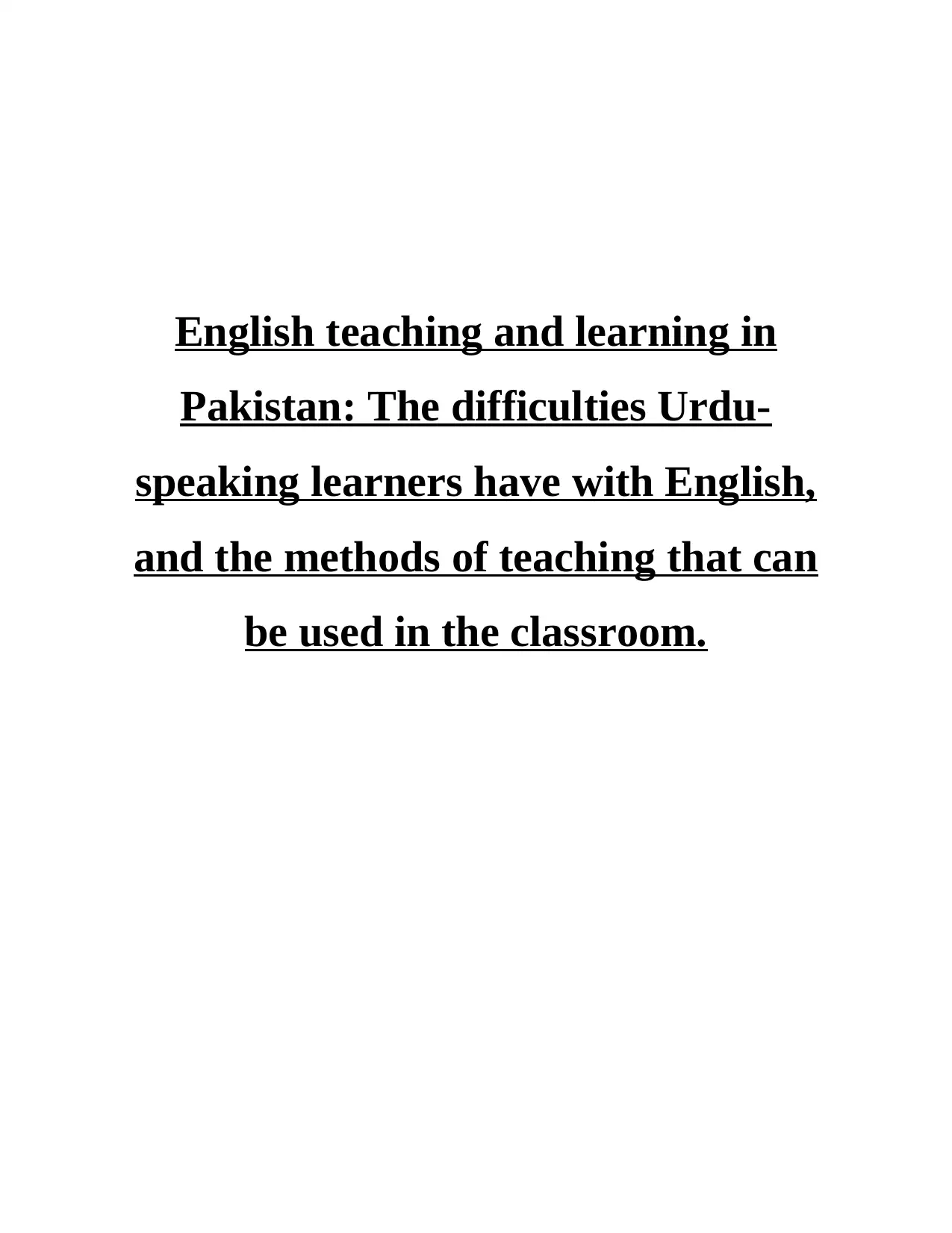
English teaching and learning in
Pakistan: The difficulties Urdu-
speaking learners have with English,
and the methods of teaching that can
be used in the classroom.
Pakistan: The difficulties Urdu-
speaking learners have with English,
and the methods of teaching that can
be used in the classroom.
Paraphrase This Document
Need a fresh take? Get an instant paraphrase of this document with our AI Paraphraser
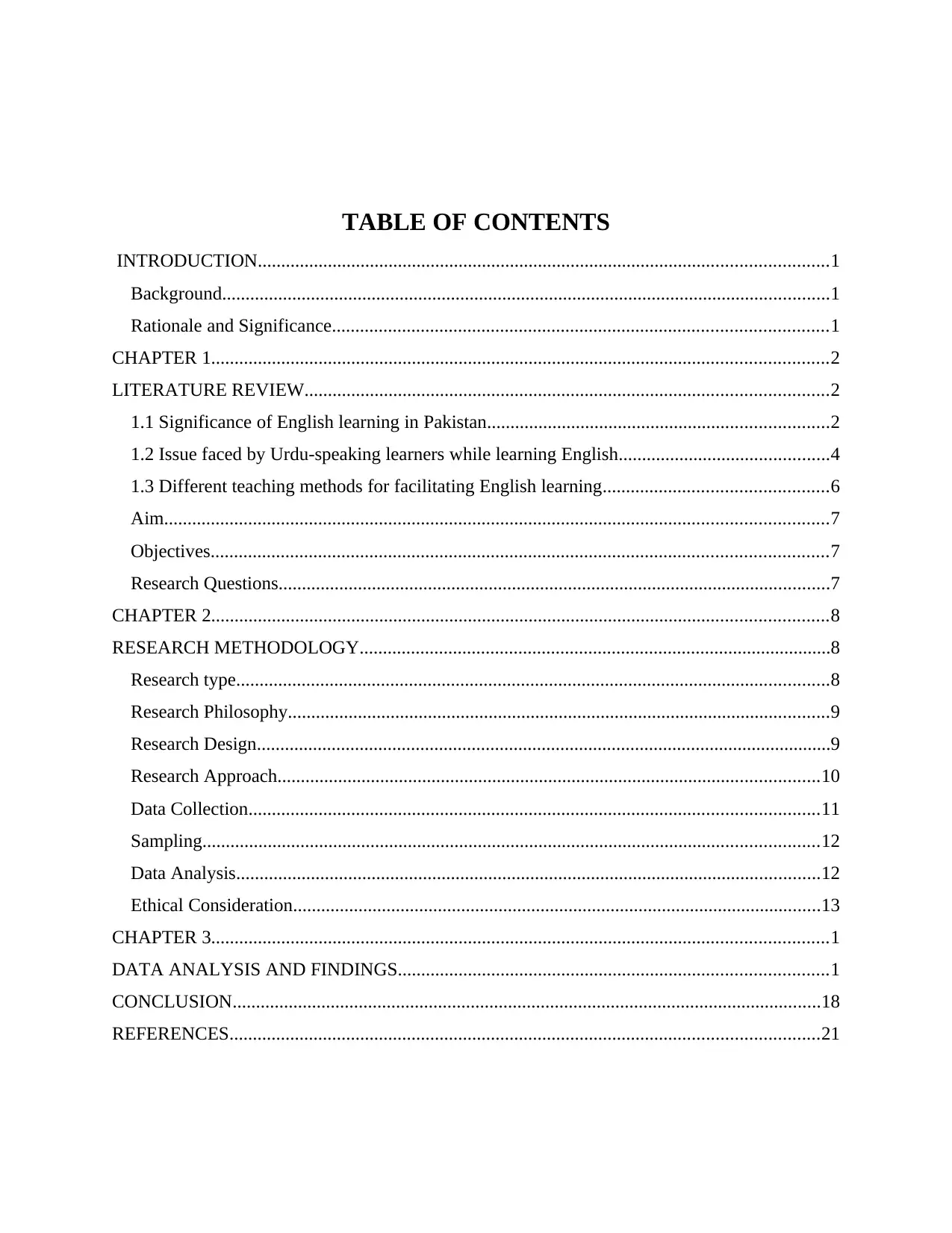
TABLE OF CONTENTS
INTRODUCTION..........................................................................................................................1
Background..................................................................................................................................1
Rationale and Significance..........................................................................................................1
CHAPTER 1....................................................................................................................................2
LITERATURE REVIEW................................................................................................................2
1.1 Significance of English learning in Pakistan.........................................................................2
1.2 Issue faced by Urdu-speaking learners while learning English.............................................4
1.3 Different teaching methods for facilitating English learning................................................6
Aim..............................................................................................................................................7
Objectives....................................................................................................................................7
Research Questions......................................................................................................................7
CHAPTER 2....................................................................................................................................8
RESEARCH METHODOLOGY.....................................................................................................8
Research type...............................................................................................................................8
Research Philosophy....................................................................................................................9
Research Design...........................................................................................................................9
Research Approach....................................................................................................................10
Data Collection..........................................................................................................................11
Sampling....................................................................................................................................12
Data Analysis.............................................................................................................................12
Ethical Consideration.................................................................................................................13
CHAPTER 3....................................................................................................................................1
DATA ANALYSIS AND FINDINGS............................................................................................1
CONCLUSION..............................................................................................................................18
REFERENCES..............................................................................................................................21
INTRODUCTION..........................................................................................................................1
Background..................................................................................................................................1
Rationale and Significance..........................................................................................................1
CHAPTER 1....................................................................................................................................2
LITERATURE REVIEW................................................................................................................2
1.1 Significance of English learning in Pakistan.........................................................................2
1.2 Issue faced by Urdu-speaking learners while learning English.............................................4
1.3 Different teaching methods for facilitating English learning................................................6
Aim..............................................................................................................................................7
Objectives....................................................................................................................................7
Research Questions......................................................................................................................7
CHAPTER 2....................................................................................................................................8
RESEARCH METHODOLOGY.....................................................................................................8
Research type...............................................................................................................................8
Research Philosophy....................................................................................................................9
Research Design...........................................................................................................................9
Research Approach....................................................................................................................10
Data Collection..........................................................................................................................11
Sampling....................................................................................................................................12
Data Analysis.............................................................................................................................12
Ethical Consideration.................................................................................................................13
CHAPTER 3....................................................................................................................................1
DATA ANALYSIS AND FINDINGS............................................................................................1
CONCLUSION..............................................................................................................................18
REFERENCES..............................................................................................................................21
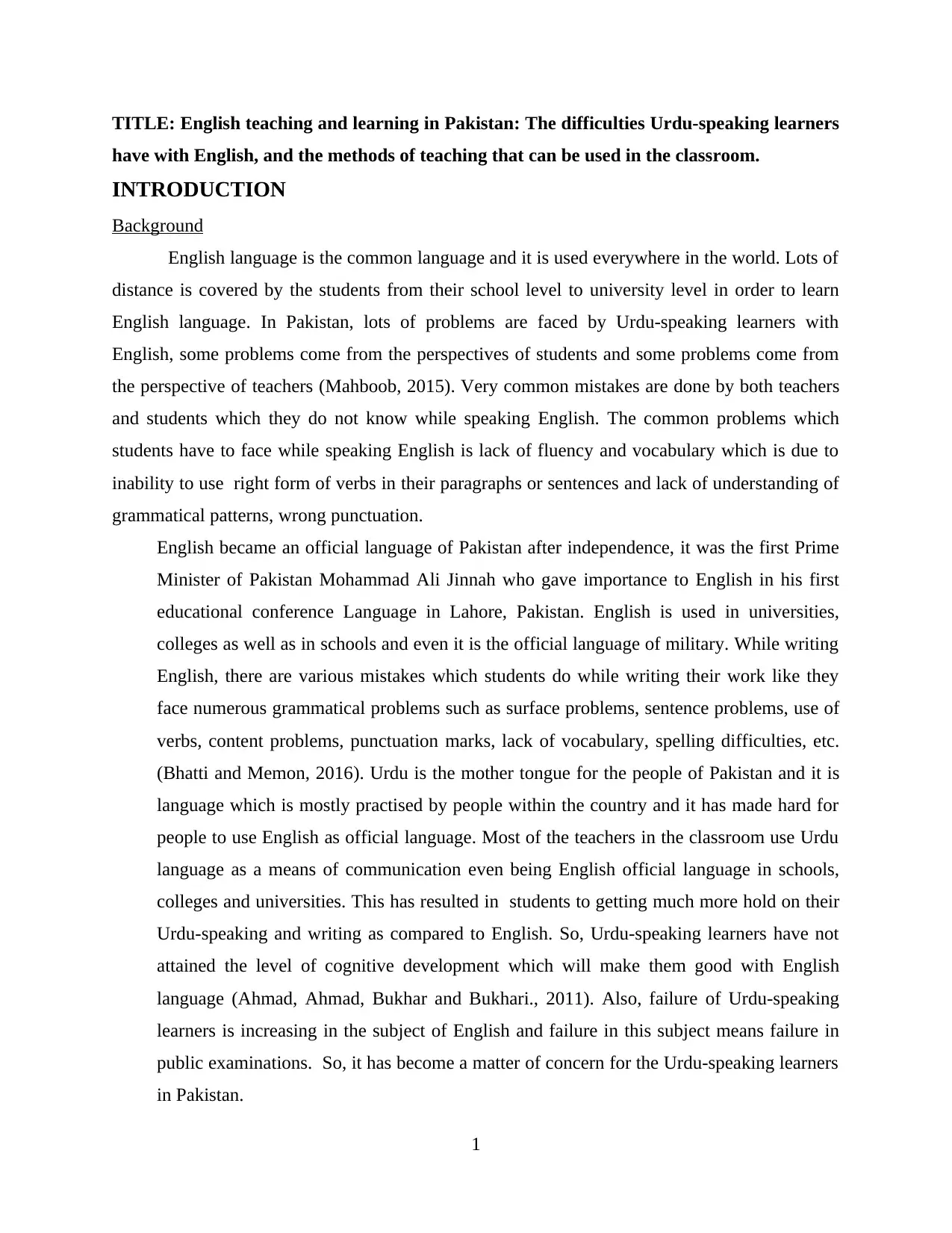
TITLE: English teaching and learning in Pakistan: The difficulties Urdu-speaking learners
have with English, and the methods of teaching that can be used in the classroom.
INTRODUCTION
Background
English language is the common language and it is used everywhere in the world. Lots of
distance is covered by the students from their school level to university level in order to learn
English language. In Pakistan, lots of problems are faced by Urdu-speaking learners with
English, some problems come from the perspectives of students and some problems come from
the perspective of teachers (Mahboob, 2015). Very common mistakes are done by both teachers
and students which they do not know while speaking English. The common problems which
students have to face while speaking English is lack of fluency and vocabulary which is due to
inability to use right form of verbs in their paragraphs or sentences and lack of understanding of
grammatical patterns, wrong punctuation.
English became an official language of Pakistan after independence, it was the first Prime
Minister of Pakistan Mohammad Ali Jinnah who gave importance to English in his first
educational conference Language in Lahore, Pakistan. English is used in universities,
colleges as well as in schools and even it is the official language of military. While writing
English, there are various mistakes which students do while writing their work like they
face numerous grammatical problems such as surface problems, sentence problems, use of
verbs, content problems, punctuation marks, lack of vocabulary, spelling difficulties, etc.
(Bhatti and Memon, 2016). Urdu is the mother tongue for the people of Pakistan and it is
language which is mostly practised by people within the country and it has made hard for
people to use English as official language. Most of the teachers in the classroom use Urdu
language as a means of communication even being English official language in schools,
colleges and universities. This has resulted in students to getting much more hold on their
Urdu-speaking and writing as compared to English. So, Urdu-speaking learners have not
attained the level of cognitive development which will make them good with English
language (Ahmad, Ahmad, Bukhar and Bukhari., 2011). Also, failure of Urdu-speaking
learners is increasing in the subject of English and failure in this subject means failure in
public examinations. So, it has become a matter of concern for the Urdu-speaking learners
in Pakistan.
1
have with English, and the methods of teaching that can be used in the classroom.
INTRODUCTION
Background
English language is the common language and it is used everywhere in the world. Lots of
distance is covered by the students from their school level to university level in order to learn
English language. In Pakistan, lots of problems are faced by Urdu-speaking learners with
English, some problems come from the perspectives of students and some problems come from
the perspective of teachers (Mahboob, 2015). Very common mistakes are done by both teachers
and students which they do not know while speaking English. The common problems which
students have to face while speaking English is lack of fluency and vocabulary which is due to
inability to use right form of verbs in their paragraphs or sentences and lack of understanding of
grammatical patterns, wrong punctuation.
English became an official language of Pakistan after independence, it was the first Prime
Minister of Pakistan Mohammad Ali Jinnah who gave importance to English in his first
educational conference Language in Lahore, Pakistan. English is used in universities,
colleges as well as in schools and even it is the official language of military. While writing
English, there are various mistakes which students do while writing their work like they
face numerous grammatical problems such as surface problems, sentence problems, use of
verbs, content problems, punctuation marks, lack of vocabulary, spelling difficulties, etc.
(Bhatti and Memon, 2016). Urdu is the mother tongue for the people of Pakistan and it is
language which is mostly practised by people within the country and it has made hard for
people to use English as official language. Most of the teachers in the classroom use Urdu
language as a means of communication even being English official language in schools,
colleges and universities. This has resulted in students to getting much more hold on their
Urdu-speaking and writing as compared to English. So, Urdu-speaking learners have not
attained the level of cognitive development which will make them good with English
language (Ahmad, Ahmad, Bukhar and Bukhari., 2011). Also, failure of Urdu-speaking
learners is increasing in the subject of English and failure in this subject means failure in
public examinations. So, it has become a matter of concern for the Urdu-speaking learners
in Pakistan.
1
⊘ This is a preview!⊘
Do you want full access?
Subscribe today to unlock all pages.

Trusted by 1+ million students worldwide
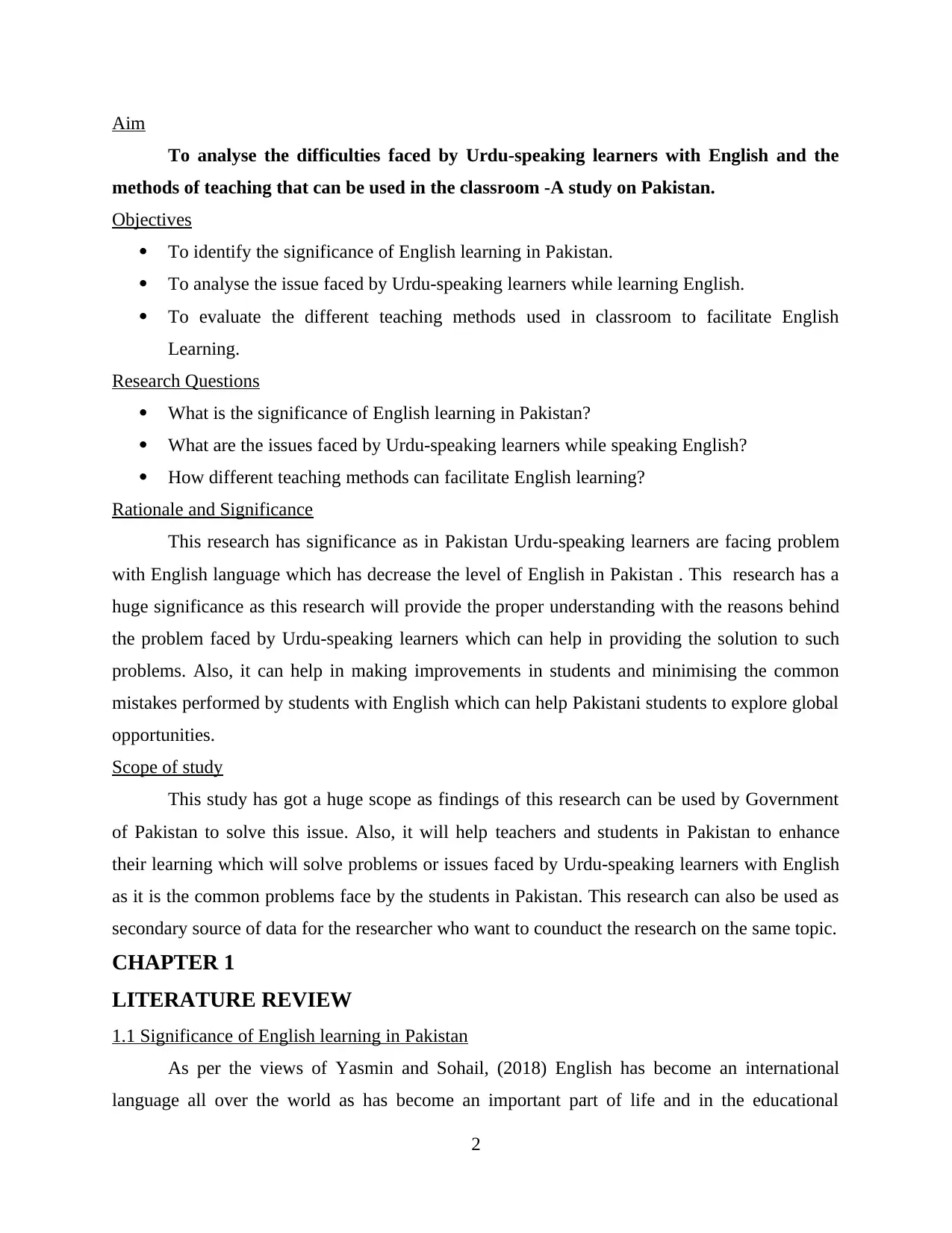
Aim
To analyse the difficulties faced by Urdu-speaking learners with English and the
methods of teaching that can be used in the classroom -A study on Pakistan.
Objectives
To identify the significance of English learning in Pakistan.
To analyse the issue faced by Urdu-speaking learners while learning English.
To evaluate the different teaching methods used in classroom to facilitate English
Learning.
Research Questions
What is the significance of English learning in Pakistan?
What are the issues faced by Urdu-speaking learners while speaking English?
How different teaching methods can facilitate English learning?
Rationale and Significance
This research has significance as in Pakistan Urdu-speaking learners are facing problem
with English language which has decrease the level of English in Pakistan . This research has a
huge significance as this research will provide the proper understanding with the reasons behind
the problem faced by Urdu-speaking learners which can help in providing the solution to such
problems. Also, it can help in making improvements in students and minimising the common
mistakes performed by students with English which can help Pakistani students to explore global
opportunities.
Scope of study
This study has got a huge scope as findings of this research can be used by Government
of Pakistan to solve this issue. Also, it will help teachers and students in Pakistan to enhance
their learning which will solve problems or issues faced by Urdu-speaking learners with English
as it is the common problems face by the students in Pakistan. This research can also be used as
secondary source of data for the researcher who want to counduct the research on the same topic.
CHAPTER 1
LITERATURE REVIEW
1.1 Significance of English learning in Pakistan
As per the views of Yasmin and Sohail, (2018) English has become an international
language all over the world as has become an important part of life and in the educational
2
To analyse the difficulties faced by Urdu-speaking learners with English and the
methods of teaching that can be used in the classroom -A study on Pakistan.
Objectives
To identify the significance of English learning in Pakistan.
To analyse the issue faced by Urdu-speaking learners while learning English.
To evaluate the different teaching methods used in classroom to facilitate English
Learning.
Research Questions
What is the significance of English learning in Pakistan?
What are the issues faced by Urdu-speaking learners while speaking English?
How different teaching methods can facilitate English learning?
Rationale and Significance
This research has significance as in Pakistan Urdu-speaking learners are facing problem
with English language which has decrease the level of English in Pakistan . This research has a
huge significance as this research will provide the proper understanding with the reasons behind
the problem faced by Urdu-speaking learners which can help in providing the solution to such
problems. Also, it can help in making improvements in students and minimising the common
mistakes performed by students with English which can help Pakistani students to explore global
opportunities.
Scope of study
This study has got a huge scope as findings of this research can be used by Government
of Pakistan to solve this issue. Also, it will help teachers and students in Pakistan to enhance
their learning which will solve problems or issues faced by Urdu-speaking learners with English
as it is the common problems face by the students in Pakistan. This research can also be used as
secondary source of data for the researcher who want to counduct the research on the same topic.
CHAPTER 1
LITERATURE REVIEW
1.1 Significance of English learning in Pakistan
As per the views of Yasmin and Sohail, (2018) English has become an international
language all over the world as has become an important part of life and in the educational
2
Paraphrase This Document
Need a fresh take? Get an instant paraphrase of this document with our AI Paraphraser
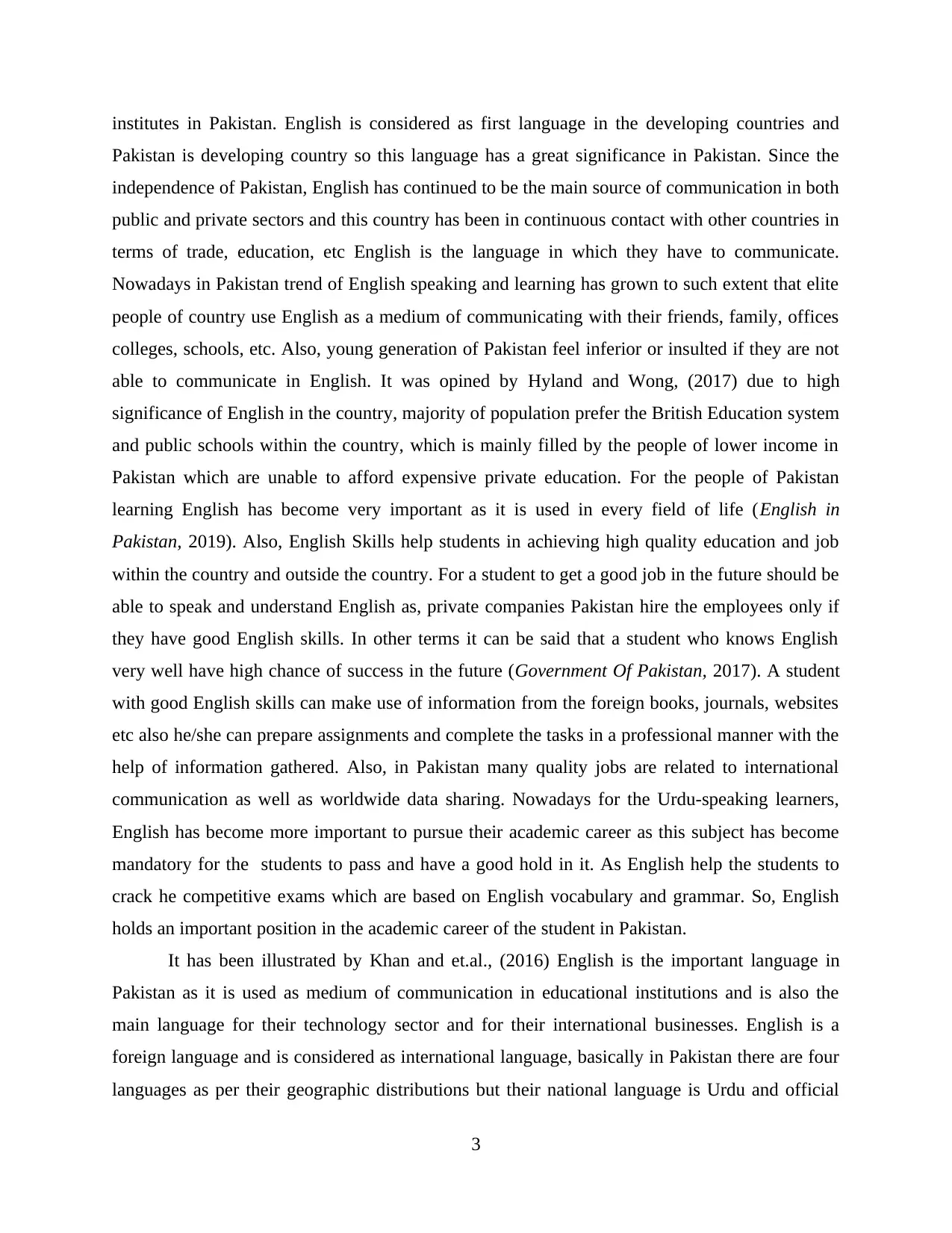
institutes in Pakistan. English is considered as first language in the developing countries and
Pakistan is developing country so this language has a great significance in Pakistan. Since the
independence of Pakistan, English has continued to be the main source of communication in both
public and private sectors and this country has been in continuous contact with other countries in
terms of trade, education, etc English is the language in which they have to communicate.
Nowadays in Pakistan trend of English speaking and learning has grown to such extent that elite
people of country use English as a medium of communicating with their friends, family, offices
colleges, schools, etc. Also, young generation of Pakistan feel inferior or insulted if they are not
able to communicate in English. It was opined by Hyland and Wong, (2017) due to high
significance of English in the country, majority of population prefer the British Education system
and public schools within the country, which is mainly filled by the people of lower income in
Pakistan which are unable to afford expensive private education. For the people of Pakistan
learning English has become very important as it is used in every field of life (English in
Pakistan, 2019). Also, English Skills help students in achieving high quality education and job
within the country and outside the country. For a student to get a good job in the future should be
able to speak and understand English as, private companies Pakistan hire the employees only if
they have good English skills. In other terms it can be said that a student who knows English
very well have high chance of success in the future (Government Of Pakistan, 2017). A student
with good English skills can make use of information from the foreign books, journals, websites
etc also he/she can prepare assignments and complete the tasks in a professional manner with the
help of information gathered. Also, in Pakistan many quality jobs are related to international
communication as well as worldwide data sharing. Nowadays for the Urdu-speaking learners,
English has become more important to pursue their academic career as this subject has become
mandatory for the students to pass and have a good hold in it. As English help the students to
crack he competitive exams which are based on English vocabulary and grammar. So, English
holds an important position in the academic career of the student in Pakistan.
It has been illustrated by Khan and et.al., (2016) English is the important language in
Pakistan as it is used as medium of communication in educational institutions and is also the
main language for their technology sector and for their international businesses. English is a
foreign language and is considered as international language, basically in Pakistan there are four
languages as per their geographic distributions but their national language is Urdu and official
3
Pakistan is developing country so this language has a great significance in Pakistan. Since the
independence of Pakistan, English has continued to be the main source of communication in both
public and private sectors and this country has been in continuous contact with other countries in
terms of trade, education, etc English is the language in which they have to communicate.
Nowadays in Pakistan trend of English speaking and learning has grown to such extent that elite
people of country use English as a medium of communicating with their friends, family, offices
colleges, schools, etc. Also, young generation of Pakistan feel inferior or insulted if they are not
able to communicate in English. It was opined by Hyland and Wong, (2017) due to high
significance of English in the country, majority of population prefer the British Education system
and public schools within the country, which is mainly filled by the people of lower income in
Pakistan which are unable to afford expensive private education. For the people of Pakistan
learning English has become very important as it is used in every field of life (English in
Pakistan, 2019). Also, English Skills help students in achieving high quality education and job
within the country and outside the country. For a student to get a good job in the future should be
able to speak and understand English as, private companies Pakistan hire the employees only if
they have good English skills. In other terms it can be said that a student who knows English
very well have high chance of success in the future (Government Of Pakistan, 2017). A student
with good English skills can make use of information from the foreign books, journals, websites
etc also he/she can prepare assignments and complete the tasks in a professional manner with the
help of information gathered. Also, in Pakistan many quality jobs are related to international
communication as well as worldwide data sharing. Nowadays for the Urdu-speaking learners,
English has become more important to pursue their academic career as this subject has become
mandatory for the students to pass and have a good hold in it. As English help the students to
crack he competitive exams which are based on English vocabulary and grammar. So, English
holds an important position in the academic career of the student in Pakistan.
It has been illustrated by Khan and et.al., (2016) English is the important language in
Pakistan as it is used as medium of communication in educational institutions and is also the
main language for their technology sector and for their international businesses. English is a
foreign language and is considered as international language, basically in Pakistan there are four
languages as per their geographic distributions but their national language is Urdu and official
3
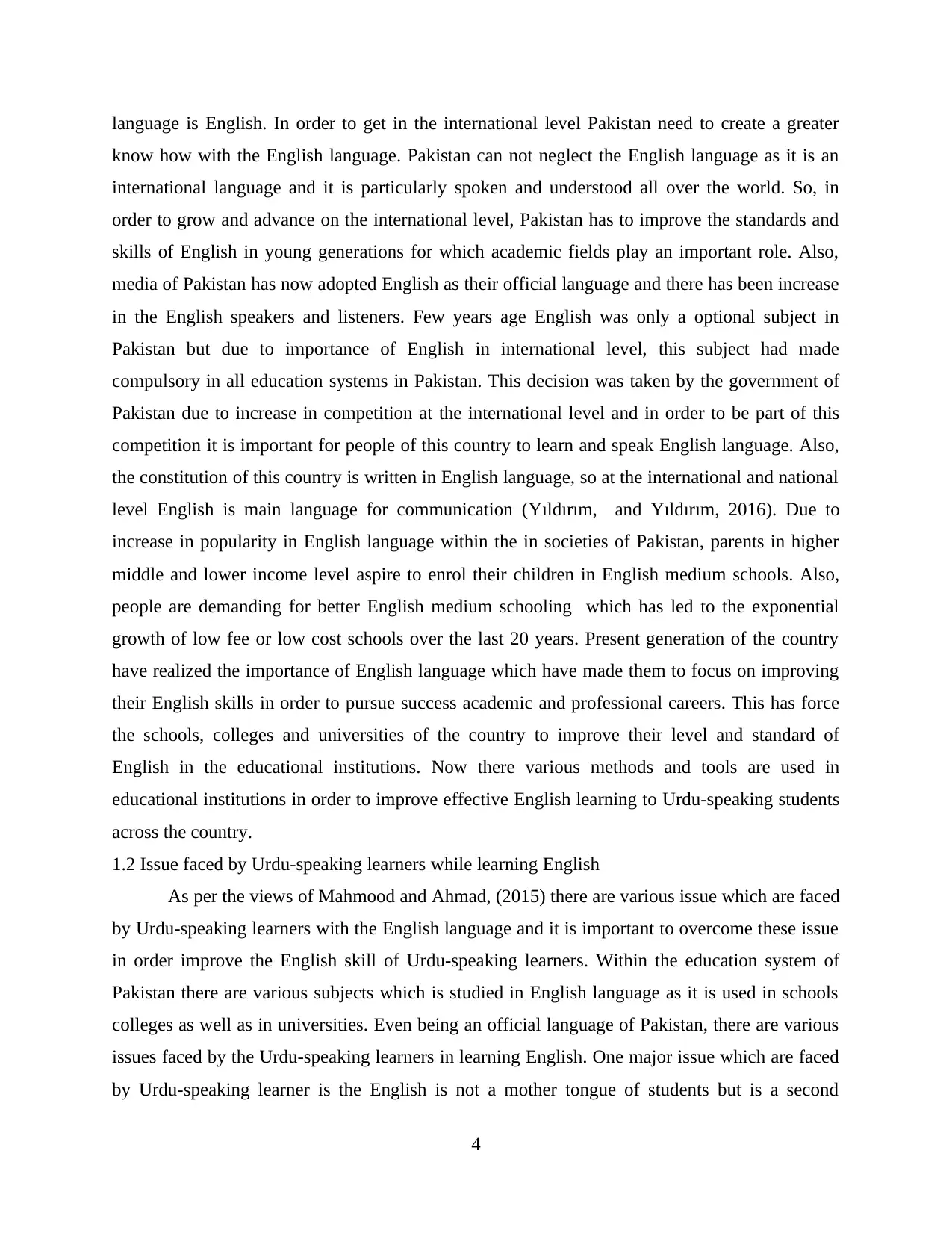
language is English. In order to get in the international level Pakistan need to create a greater
know how with the English language. Pakistan can not neglect the English language as it is an
international language and it is particularly spoken and understood all over the world. So, in
order to grow and advance on the international level, Pakistan has to improve the standards and
skills of English in young generations for which academic fields play an important role. Also,
media of Pakistan has now adopted English as their official language and there has been increase
in the English speakers and listeners. Few years age English was only a optional subject in
Pakistan but due to importance of English in international level, this subject had made
compulsory in all education systems in Pakistan. This decision was taken by the government of
Pakistan due to increase in competition at the international level and in order to be part of this
competition it is important for people of this country to learn and speak English language. Also,
the constitution of this country is written in English language, so at the international and national
level English is main language for communication (Yıldırım, and Yıldırım, 2016). Due to
increase in popularity in English language within the in societies of Pakistan, parents in higher
middle and lower income level aspire to enrol their children in English medium schools. Also,
people are demanding for better English medium schooling which has led to the exponential
growth of low fee or low cost schools over the last 20 years. Present generation of the country
have realized the importance of English language which have made them to focus on improving
their English skills in order to pursue success academic and professional careers. This has force
the schools, colleges and universities of the country to improve their level and standard of
English in the educational institutions. Now there various methods and tools are used in
educational institutions in order to improve effective English learning to Urdu-speaking students
across the country.
1.2 Issue faced by Urdu-speaking learners while learning English
As per the views of Mahmood and Ahmad, (2015) there are various issue which are faced
by Urdu-speaking learners with the English language and it is important to overcome these issue
in order improve the English skill of Urdu-speaking learners. Within the education system of
Pakistan there are various subjects which is studied in English language as it is used in schools
colleges as well as in universities. Even being an official language of Pakistan, there are various
issues faced by the Urdu-speaking learners in learning English. One major issue which are faced
by Urdu-speaking learner is the English is not a mother tongue of students but is a second
4
know how with the English language. Pakistan can not neglect the English language as it is an
international language and it is particularly spoken and understood all over the world. So, in
order to grow and advance on the international level, Pakistan has to improve the standards and
skills of English in young generations for which academic fields play an important role. Also,
media of Pakistan has now adopted English as their official language and there has been increase
in the English speakers and listeners. Few years age English was only a optional subject in
Pakistan but due to importance of English in international level, this subject had made
compulsory in all education systems in Pakistan. This decision was taken by the government of
Pakistan due to increase in competition at the international level and in order to be part of this
competition it is important for people of this country to learn and speak English language. Also,
the constitution of this country is written in English language, so at the international and national
level English is main language for communication (Yıldırım, and Yıldırım, 2016). Due to
increase in popularity in English language within the in societies of Pakistan, parents in higher
middle and lower income level aspire to enrol their children in English medium schools. Also,
people are demanding for better English medium schooling which has led to the exponential
growth of low fee or low cost schools over the last 20 years. Present generation of the country
have realized the importance of English language which have made them to focus on improving
their English skills in order to pursue success academic and professional careers. This has force
the schools, colleges and universities of the country to improve their level and standard of
English in the educational institutions. Now there various methods and tools are used in
educational institutions in order to improve effective English learning to Urdu-speaking students
across the country.
1.2 Issue faced by Urdu-speaking learners while learning English
As per the views of Mahmood and Ahmad, (2015) there are various issue which are faced
by Urdu-speaking learners with the English language and it is important to overcome these issue
in order improve the English skill of Urdu-speaking learners. Within the education system of
Pakistan there are various subjects which is studied in English language as it is used in schools
colleges as well as in universities. Even being an official language of Pakistan, there are various
issues faced by the Urdu-speaking learners in learning English. One major issue which are faced
by Urdu-speaking learner is the English is not a mother tongue of students but is a second
4
⊘ This is a preview!⊘
Do you want full access?
Subscribe today to unlock all pages.

Trusted by 1+ million students worldwide
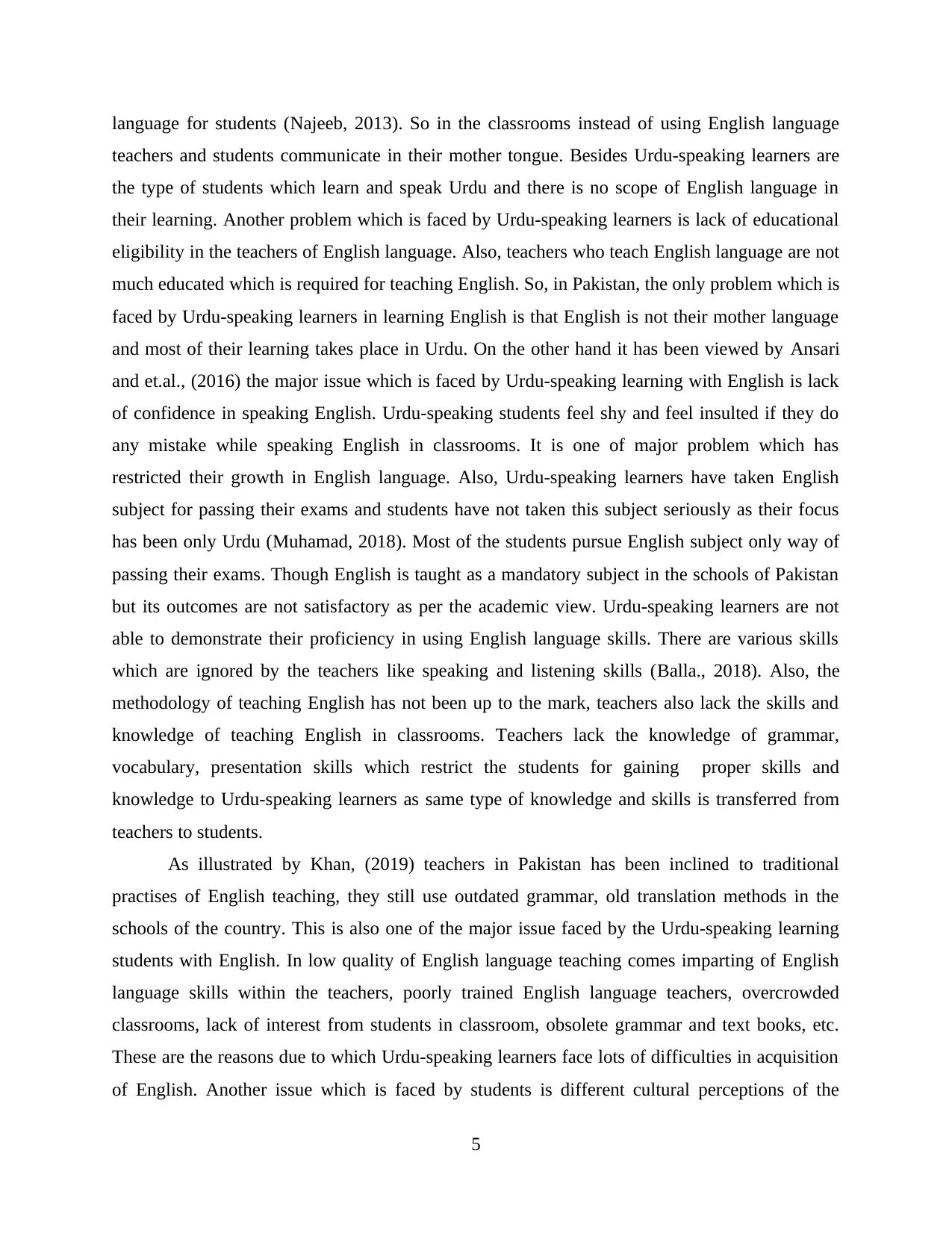
language for students (Najeeb, 2013). So in the classrooms instead of using English language
teachers and students communicate in their mother tongue. Besides Urdu-speaking learners are
the type of students which learn and speak Urdu and there is no scope of English language in
their learning. Another problem which is faced by Urdu-speaking learners is lack of educational
eligibility in the teachers of English language. Also, teachers who teach English language are not
much educated which is required for teaching English. So, in Pakistan, the only problem which is
faced by Urdu-speaking learners in learning English is that English is not their mother language
and most of their learning takes place in Urdu. On the other hand it has been viewed by Ansari
and et.al., (2016) the major issue which is faced by Urdu-speaking learning with English is lack
of confidence in speaking English. Urdu-speaking students feel shy and feel insulted if they do
any mistake while speaking English in classrooms. It is one of major problem which has
restricted their growth in English language. Also, Urdu-speaking learners have taken English
subject for passing their exams and students have not taken this subject seriously as their focus
has been only Urdu (Muhamad, 2018). Most of the students pursue English subject only way of
passing their exams. Though English is taught as a mandatory subject in the schools of Pakistan
but its outcomes are not satisfactory as per the academic view. Urdu-speaking learners are not
able to demonstrate their proficiency in using English language skills. There are various skills
which are ignored by the teachers like speaking and listening skills (Balla., 2018). Also, the
methodology of teaching English has not been up to the mark, teachers also lack the skills and
knowledge of teaching English in classrooms. Teachers lack the knowledge of grammar,
vocabulary, presentation skills which restrict the students for gaining proper skills and
knowledge to Urdu-speaking learners as same type of knowledge and skills is transferred from
teachers to students.
As illustrated by Khan, (2019) teachers in Pakistan has been inclined to traditional
practises of English teaching, they still use outdated grammar, old translation methods in the
schools of the country. This is also one of the major issue faced by the Urdu-speaking learning
students with English. In low quality of English language teaching comes imparting of English
language skills within the teachers, poorly trained English language teachers, overcrowded
classrooms, lack of interest from students in classroom, obsolete grammar and text books, etc.
These are the reasons due to which Urdu-speaking learners face lots of difficulties in acquisition
of English. Another issue which is faced by students is different cultural perceptions of the
5
teachers and students communicate in their mother tongue. Besides Urdu-speaking learners are
the type of students which learn and speak Urdu and there is no scope of English language in
their learning. Another problem which is faced by Urdu-speaking learners is lack of educational
eligibility in the teachers of English language. Also, teachers who teach English language are not
much educated which is required for teaching English. So, in Pakistan, the only problem which is
faced by Urdu-speaking learners in learning English is that English is not their mother language
and most of their learning takes place in Urdu. On the other hand it has been viewed by Ansari
and et.al., (2016) the major issue which is faced by Urdu-speaking learning with English is lack
of confidence in speaking English. Urdu-speaking students feel shy and feel insulted if they do
any mistake while speaking English in classrooms. It is one of major problem which has
restricted their growth in English language. Also, Urdu-speaking learners have taken English
subject for passing their exams and students have not taken this subject seriously as their focus
has been only Urdu (Muhamad, 2018). Most of the students pursue English subject only way of
passing their exams. Though English is taught as a mandatory subject in the schools of Pakistan
but its outcomes are not satisfactory as per the academic view. Urdu-speaking learners are not
able to demonstrate their proficiency in using English language skills. There are various skills
which are ignored by the teachers like speaking and listening skills (Balla., 2018). Also, the
methodology of teaching English has not been up to the mark, teachers also lack the skills and
knowledge of teaching English in classrooms. Teachers lack the knowledge of grammar,
vocabulary, presentation skills which restrict the students for gaining proper skills and
knowledge to Urdu-speaking learners as same type of knowledge and skills is transferred from
teachers to students.
As illustrated by Khan, (2019) teachers in Pakistan has been inclined to traditional
practises of English teaching, they still use outdated grammar, old translation methods in the
schools of the country. This is also one of the major issue faced by the Urdu-speaking learning
students with English. In low quality of English language teaching comes imparting of English
language skills within the teachers, poorly trained English language teachers, overcrowded
classrooms, lack of interest from students in classroom, obsolete grammar and text books, etc.
These are the reasons due to which Urdu-speaking learners face lots of difficulties in acquisition
of English. Another issue which is faced by students is different cultural perceptions of the
5
Paraphrase This Document
Need a fresh take? Get an instant paraphrase of this document with our AI Paraphraser
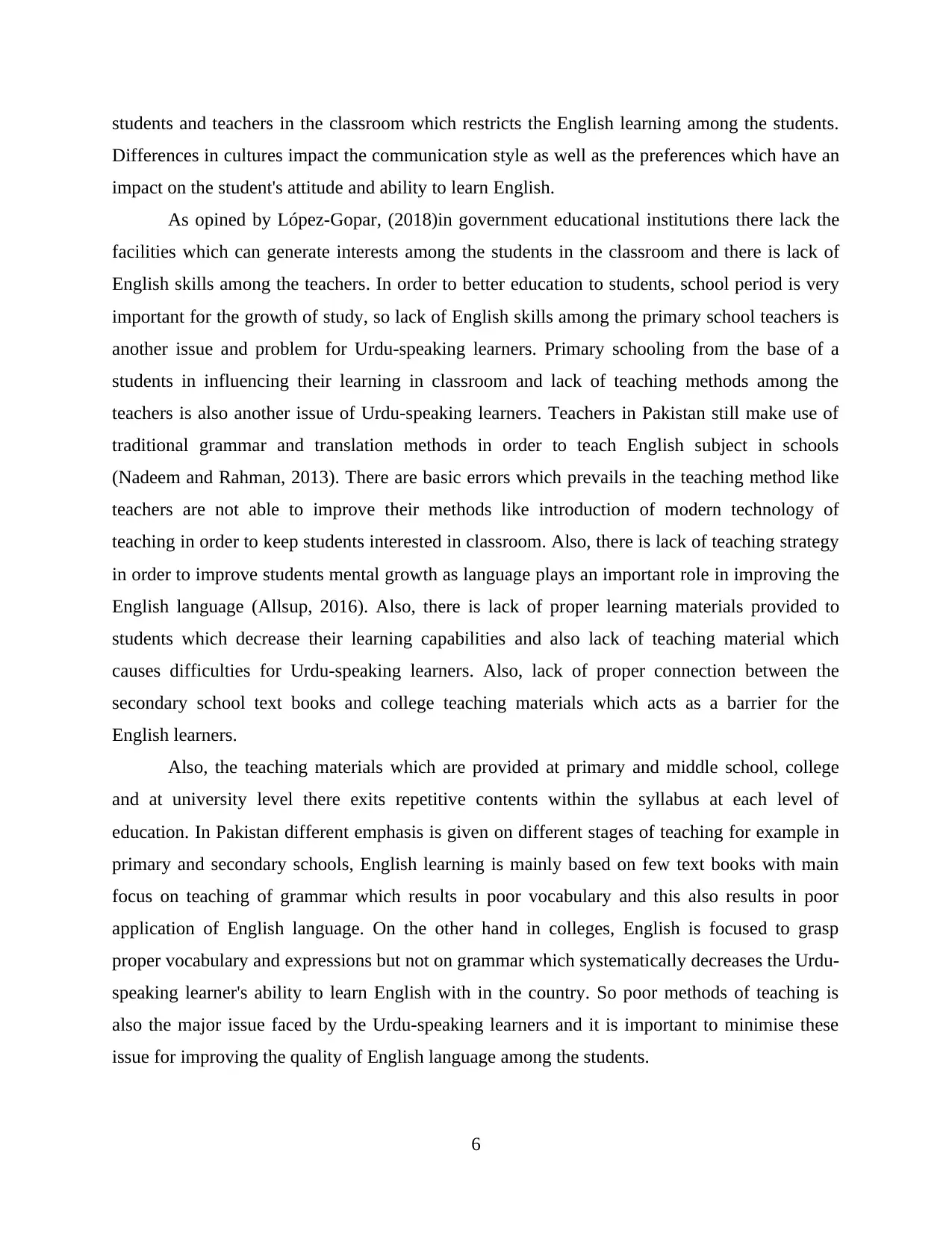
students and teachers in the classroom which restricts the English learning among the students.
Differences in cultures impact the communication style as well as the preferences which have an
impact on the student's attitude and ability to learn English.
As opined by López-Gopar, (2018)in government educational institutions there lack the
facilities which can generate interests among the students in the classroom and there is lack of
English skills among the teachers. In order to better education to students, school period is very
important for the growth of study, so lack of English skills among the primary school teachers is
another issue and problem for Urdu-speaking learners. Primary schooling from the base of a
students in influencing their learning in classroom and lack of teaching methods among the
teachers is also another issue of Urdu-speaking learners. Teachers in Pakistan still make use of
traditional grammar and translation methods in order to teach English subject in schools
(Nadeem and Rahman, 2013). There are basic errors which prevails in the teaching method like
teachers are not able to improve their methods like introduction of modern technology of
teaching in order to keep students interested in classroom. Also, there is lack of teaching strategy
in order to improve students mental growth as language plays an important role in improving the
English language (Allsup, 2016). Also, there is lack of proper learning materials provided to
students which decrease their learning capabilities and also lack of teaching material which
causes difficulties for Urdu-speaking learners. Also, lack of proper connection between the
secondary school text books and college teaching materials which acts as a barrier for the
English learners.
Also, the teaching materials which are provided at primary and middle school, college
and at university level there exits repetitive contents within the syllabus at each level of
education. In Pakistan different emphasis is given on different stages of teaching for example in
primary and secondary schools, English learning is mainly based on few text books with main
focus on teaching of grammar which results in poor vocabulary and this also results in poor
application of English language. On the other hand in colleges, English is focused to grasp
proper vocabulary and expressions but not on grammar which systematically decreases the Urdu-
speaking learner's ability to learn English with in the country. So poor methods of teaching is
also the major issue faced by the Urdu-speaking learners and it is important to minimise these
issue for improving the quality of English language among the students.
6
Differences in cultures impact the communication style as well as the preferences which have an
impact on the student's attitude and ability to learn English.
As opined by López-Gopar, (2018)in government educational institutions there lack the
facilities which can generate interests among the students in the classroom and there is lack of
English skills among the teachers. In order to better education to students, school period is very
important for the growth of study, so lack of English skills among the primary school teachers is
another issue and problem for Urdu-speaking learners. Primary schooling from the base of a
students in influencing their learning in classroom and lack of teaching methods among the
teachers is also another issue of Urdu-speaking learners. Teachers in Pakistan still make use of
traditional grammar and translation methods in order to teach English subject in schools
(Nadeem and Rahman, 2013). There are basic errors which prevails in the teaching method like
teachers are not able to improve their methods like introduction of modern technology of
teaching in order to keep students interested in classroom. Also, there is lack of teaching strategy
in order to improve students mental growth as language plays an important role in improving the
English language (Allsup, 2016). Also, there is lack of proper learning materials provided to
students which decrease their learning capabilities and also lack of teaching material which
causes difficulties for Urdu-speaking learners. Also, lack of proper connection between the
secondary school text books and college teaching materials which acts as a barrier for the
English learners.
Also, the teaching materials which are provided at primary and middle school, college
and at university level there exits repetitive contents within the syllabus at each level of
education. In Pakistan different emphasis is given on different stages of teaching for example in
primary and secondary schools, English learning is mainly based on few text books with main
focus on teaching of grammar which results in poor vocabulary and this also results in poor
application of English language. On the other hand in colleges, English is focused to grasp
proper vocabulary and expressions but not on grammar which systematically decreases the Urdu-
speaking learner's ability to learn English with in the country. So poor methods of teaching is
also the major issue faced by the Urdu-speaking learners and it is important to minimise these
issue for improving the quality of English language among the students.
6
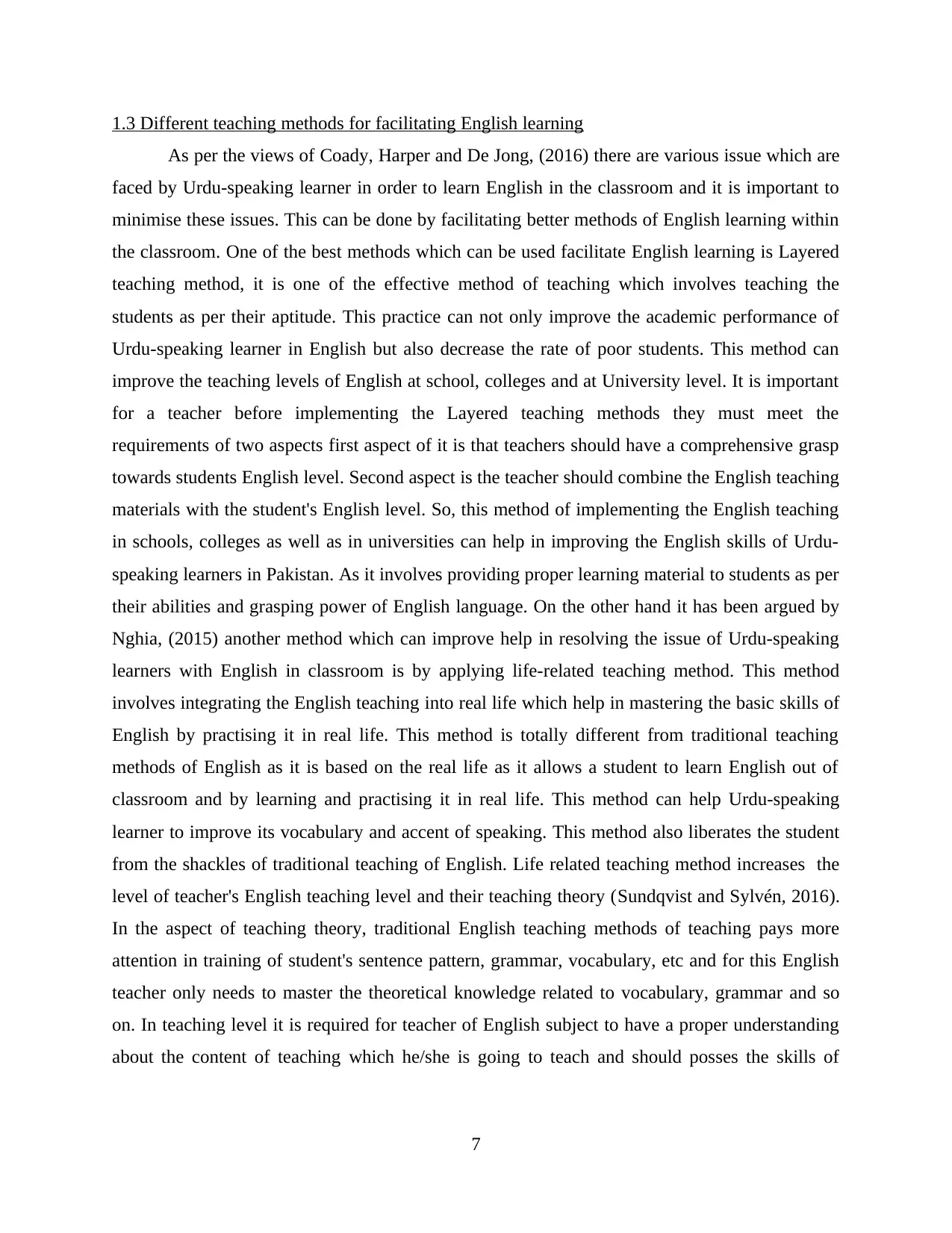
1.3 Different teaching methods for facilitating English learning
As per the views of Coady, Harper and De Jong, (2016) there are various issue which are
faced by Urdu-speaking learner in order to learn English in the classroom and it is important to
minimise these issues. This can be done by facilitating better methods of English learning within
the classroom. One of the best methods which can be used facilitate English learning is Layered
teaching method, it is one of the effective method of teaching which involves teaching the
students as per their aptitude. This practice can not only improve the academic performance of
Urdu-speaking learner in English but also decrease the rate of poor students. This method can
improve the teaching levels of English at school, colleges and at University level. It is important
for a teacher before implementing the Layered teaching methods they must meet the
requirements of two aspects first aspect of it is that teachers should have a comprehensive grasp
towards students English level. Second aspect is the teacher should combine the English teaching
materials with the student's English level. So, this method of implementing the English teaching
in schools, colleges as well as in universities can help in improving the English skills of Urdu-
speaking learners in Pakistan. As it involves providing proper learning material to students as per
their abilities and grasping power of English language. On the other hand it has been argued by
Nghia, (2015) another method which can improve help in resolving the issue of Urdu-speaking
learners with English in classroom is by applying life-related teaching method. This method
involves integrating the English teaching into real life which help in mastering the basic skills of
English by practising it in real life. This method is totally different from traditional teaching
methods of English as it is based on the real life as it allows a student to learn English out of
classroom and by learning and practising it in real life. This method can help Urdu-speaking
learner to improve its vocabulary and accent of speaking. This method also liberates the student
from the shackles of traditional teaching of English. Life related teaching method increases the
level of teacher's English teaching level and their teaching theory (Sundqvist and Sylvén, 2016).
In the aspect of teaching theory, traditional English teaching methods of teaching pays more
attention in training of student's sentence pattern, grammar, vocabulary, etc and for this English
teacher only needs to master the theoretical knowledge related to vocabulary, grammar and so
on. In teaching level it is required for teacher of English subject to have a proper understanding
about the content of teaching which he/she is going to teach and should posses the skills of
7
As per the views of Coady, Harper and De Jong, (2016) there are various issue which are
faced by Urdu-speaking learner in order to learn English in the classroom and it is important to
minimise these issues. This can be done by facilitating better methods of English learning within
the classroom. One of the best methods which can be used facilitate English learning is Layered
teaching method, it is one of the effective method of teaching which involves teaching the
students as per their aptitude. This practice can not only improve the academic performance of
Urdu-speaking learner in English but also decrease the rate of poor students. This method can
improve the teaching levels of English at school, colleges and at University level. It is important
for a teacher before implementing the Layered teaching methods they must meet the
requirements of two aspects first aspect of it is that teachers should have a comprehensive grasp
towards students English level. Second aspect is the teacher should combine the English teaching
materials with the student's English level. So, this method of implementing the English teaching
in schools, colleges as well as in universities can help in improving the English skills of Urdu-
speaking learners in Pakistan. As it involves providing proper learning material to students as per
their abilities and grasping power of English language. On the other hand it has been argued by
Nghia, (2015) another method which can improve help in resolving the issue of Urdu-speaking
learners with English in classroom is by applying life-related teaching method. This method
involves integrating the English teaching into real life which help in mastering the basic skills of
English by practising it in real life. This method is totally different from traditional teaching
methods of English as it is based on the real life as it allows a student to learn English out of
classroom and by learning and practising it in real life. This method can help Urdu-speaking
learner to improve its vocabulary and accent of speaking. This method also liberates the student
from the shackles of traditional teaching of English. Life related teaching method increases the
level of teacher's English teaching level and their teaching theory (Sundqvist and Sylvén, 2016).
In the aspect of teaching theory, traditional English teaching methods of teaching pays more
attention in training of student's sentence pattern, grammar, vocabulary, etc and for this English
teacher only needs to master the theoretical knowledge related to vocabulary, grammar and so
on. In teaching level it is required for teacher of English subject to have a proper understanding
about the content of teaching which he/she is going to teach and should posses the skills of
7
⊘ This is a preview!⊘
Do you want full access?
Subscribe today to unlock all pages.

Trusted by 1+ million students worldwide
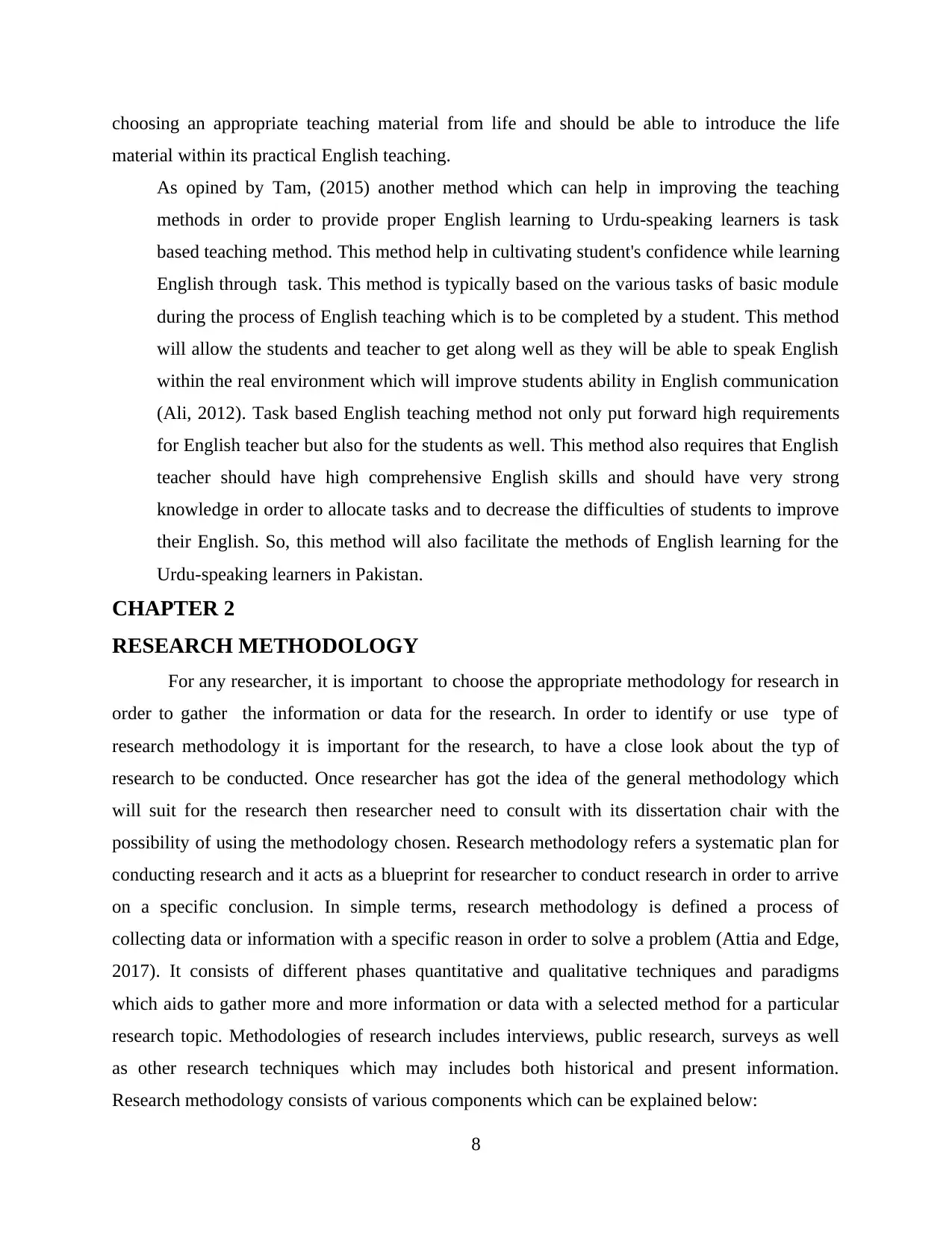
choosing an appropriate teaching material from life and should be able to introduce the life
material within its practical English teaching.
As opined by Tam, (2015) another method which can help in improving the teaching
methods in order to provide proper English learning to Urdu-speaking learners is task
based teaching method. This method help in cultivating student's confidence while learning
English through task. This method is typically based on the various tasks of basic module
during the process of English teaching which is to be completed by a student. This method
will allow the students and teacher to get along well as they will be able to speak English
within the real environment which will improve students ability in English communication
(Ali, 2012). Task based English teaching method not only put forward high requirements
for English teacher but also for the students as well. This method also requires that English
teacher should have high comprehensive English skills and should have very strong
knowledge in order to allocate tasks and to decrease the difficulties of students to improve
their English. So, this method will also facilitate the methods of English learning for the
Urdu-speaking learners in Pakistan.
CHAPTER 2
RESEARCH METHODOLOGY
For any researcher, it is important to choose the appropriate methodology for research in
order to gather the information or data for the research. In order to identify or use type of
research methodology it is important for the research, to have a close look about the typ of
research to be conducted. Once researcher has got the idea of the general methodology which
will suit for the research then researcher need to consult with its dissertation chair with the
possibility of using the methodology chosen. Research methodology refers a systematic plan for
conducting research and it acts as a blueprint for researcher to conduct research in order to arrive
on a specific conclusion. In simple terms, research methodology is defined a process of
collecting data or information with a specific reason in order to solve a problem (Attia and Edge,
2017). It consists of different phases quantitative and qualitative techniques and paradigms
which aids to gather more and more information or data with a selected method for a particular
research topic. Methodologies of research includes interviews, public research, surveys as well
as other research techniques which may includes both historical and present information.
Research methodology consists of various components which can be explained below:
8
material within its practical English teaching.
As opined by Tam, (2015) another method which can help in improving the teaching
methods in order to provide proper English learning to Urdu-speaking learners is task
based teaching method. This method help in cultivating student's confidence while learning
English through task. This method is typically based on the various tasks of basic module
during the process of English teaching which is to be completed by a student. This method
will allow the students and teacher to get along well as they will be able to speak English
within the real environment which will improve students ability in English communication
(Ali, 2012). Task based English teaching method not only put forward high requirements
for English teacher but also for the students as well. This method also requires that English
teacher should have high comprehensive English skills and should have very strong
knowledge in order to allocate tasks and to decrease the difficulties of students to improve
their English. So, this method will also facilitate the methods of English learning for the
Urdu-speaking learners in Pakistan.
CHAPTER 2
RESEARCH METHODOLOGY
For any researcher, it is important to choose the appropriate methodology for research in
order to gather the information or data for the research. In order to identify or use type of
research methodology it is important for the research, to have a close look about the typ of
research to be conducted. Once researcher has got the idea of the general methodology which
will suit for the research then researcher need to consult with its dissertation chair with the
possibility of using the methodology chosen. Research methodology refers a systematic plan for
conducting research and it acts as a blueprint for researcher to conduct research in order to arrive
on a specific conclusion. In simple terms, research methodology is defined a process of
collecting data or information with a specific reason in order to solve a problem (Attia and Edge,
2017). It consists of different phases quantitative and qualitative techniques and paradigms
which aids to gather more and more information or data with a selected method for a particular
research topic. Methodologies of research includes interviews, public research, surveys as well
as other research techniques which may includes both historical and present information.
Research methodology consists of various components which can be explained below:
8
Paraphrase This Document
Need a fresh take? Get an instant paraphrase of this document with our AI Paraphraser
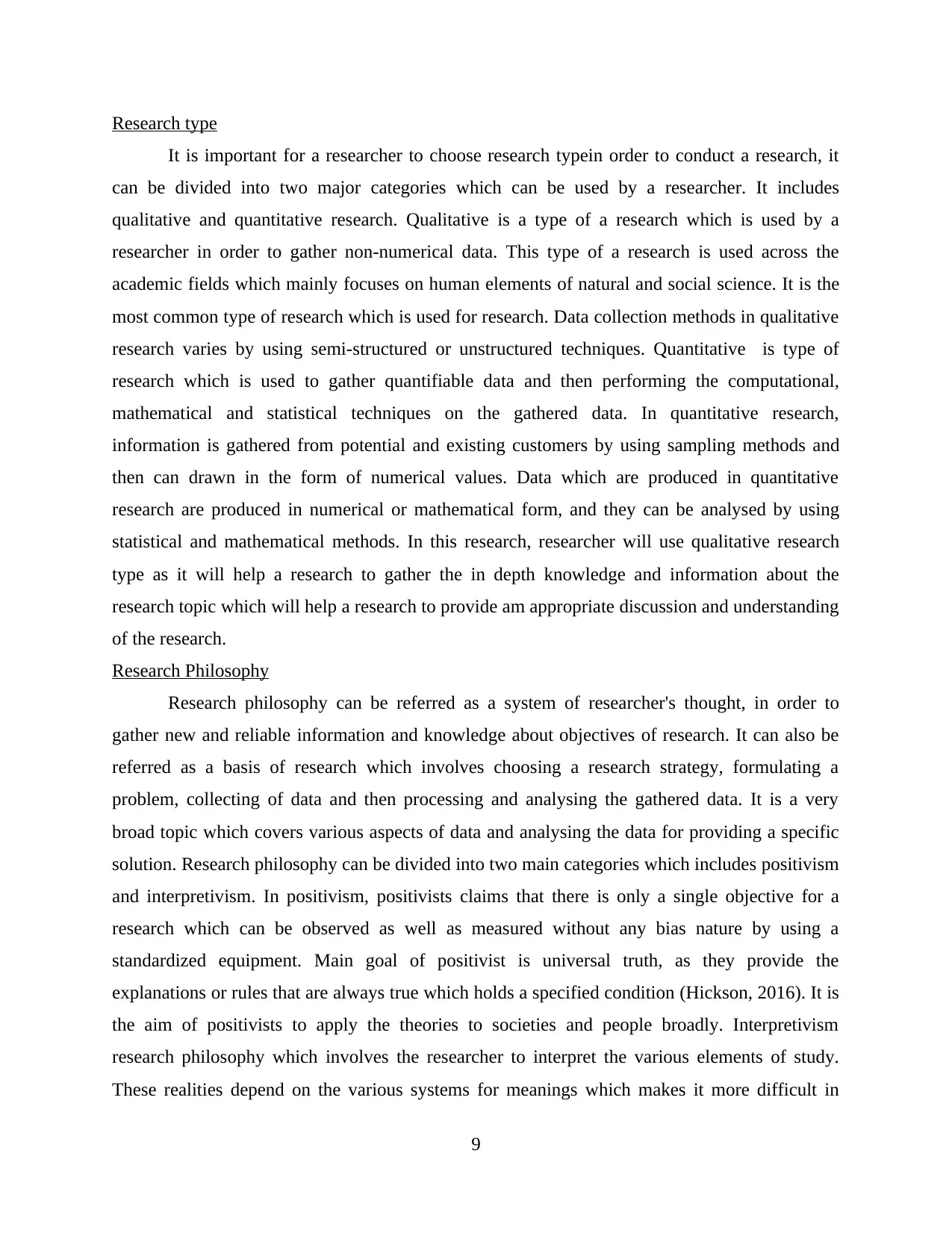
Research type
It is important for a researcher to choose research typein order to conduct a research, it
can be divided into two major categories which can be used by a researcher. It includes
qualitative and quantitative research. Qualitative is a type of a research which is used by a
researcher in order to gather non-numerical data. This type of a research is used across the
academic fields which mainly focuses on human elements of natural and social science. It is the
most common type of research which is used for research. Data collection methods in qualitative
research varies by using semi-structured or unstructured techniques. Quantitative is type of
research which is used to gather quantifiable data and then performing the computational,
mathematical and statistical techniques on the gathered data. In quantitative research,
information is gathered from potential and existing customers by using sampling methods and
then can drawn in the form of numerical values. Data which are produced in quantitative
research are produced in numerical or mathematical form, and they can be analysed by using
statistical and mathematical methods. In this research, researcher will use qualitative research
type as it will help a research to gather the in depth knowledge and information about the
research topic which will help a research to provide am appropriate discussion and understanding
of the research.
Research Philosophy
Research philosophy can be referred as a system of researcher's thought, in order to
gather new and reliable information and knowledge about objectives of research. It can also be
referred as a basis of research which involves choosing a research strategy, formulating a
problem, collecting of data and then processing and analysing the gathered data. It is a very
broad topic which covers various aspects of data and analysing the data for providing a specific
solution. Research philosophy can be divided into two main categories which includes positivism
and interpretivism. In positivism, positivists claims that there is only a single objective for a
research which can be observed as well as measured without any bias nature by using a
standardized equipment. Main goal of positivist is universal truth, as they provide the
explanations or rules that are always true which holds a specified condition (Hickson, 2016). It is
the aim of positivists to apply the theories to societies and people broadly. Interpretivism
research philosophy which involves the researcher to interpret the various elements of study.
These realities depend on the various systems for meanings which makes it more difficult in
9
It is important for a researcher to choose research typein order to conduct a research, it
can be divided into two major categories which can be used by a researcher. It includes
qualitative and quantitative research. Qualitative is a type of a research which is used by a
researcher in order to gather non-numerical data. This type of a research is used across the
academic fields which mainly focuses on human elements of natural and social science. It is the
most common type of research which is used for research. Data collection methods in qualitative
research varies by using semi-structured or unstructured techniques. Quantitative is type of
research which is used to gather quantifiable data and then performing the computational,
mathematical and statistical techniques on the gathered data. In quantitative research,
information is gathered from potential and existing customers by using sampling methods and
then can drawn in the form of numerical values. Data which are produced in quantitative
research are produced in numerical or mathematical form, and they can be analysed by using
statistical and mathematical methods. In this research, researcher will use qualitative research
type as it will help a research to gather the in depth knowledge and information about the
research topic which will help a research to provide am appropriate discussion and understanding
of the research.
Research Philosophy
Research philosophy can be referred as a system of researcher's thought, in order to
gather new and reliable information and knowledge about objectives of research. It can also be
referred as a basis of research which involves choosing a research strategy, formulating a
problem, collecting of data and then processing and analysing the gathered data. It is a very
broad topic which covers various aspects of data and analysing the data for providing a specific
solution. Research philosophy can be divided into two main categories which includes positivism
and interpretivism. In positivism, positivists claims that there is only a single objective for a
research which can be observed as well as measured without any bias nature by using a
standardized equipment. Main goal of positivist is universal truth, as they provide the
explanations or rules that are always true which holds a specified condition (Hickson, 2016). It is
the aim of positivists to apply the theories to societies and people broadly. Interpretivism
research philosophy which involves the researcher to interpret the various elements of study.
These realities depend on the various systems for meanings which makes it more difficult in
9
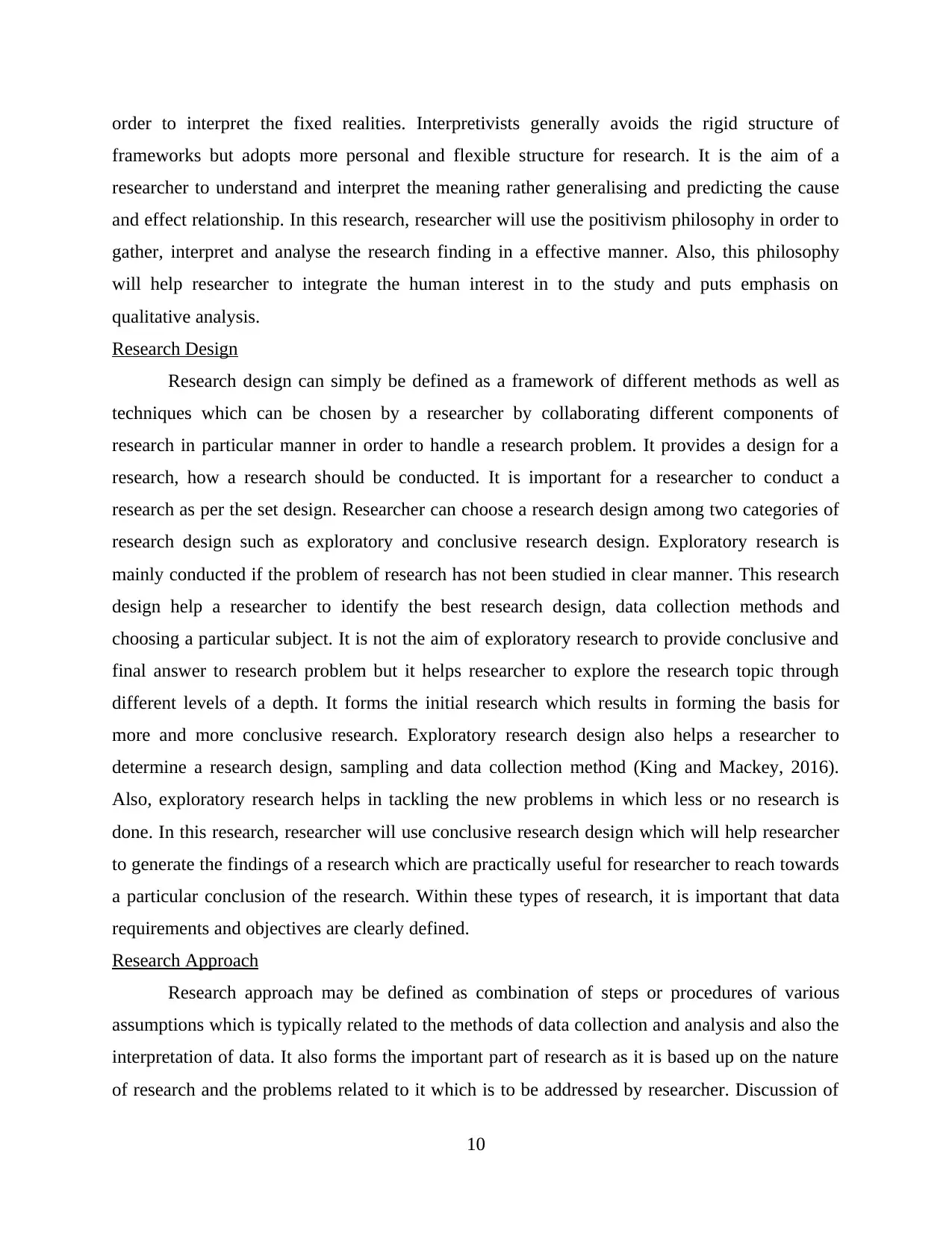
order to interpret the fixed realities. Interpretivists generally avoids the rigid structure of
frameworks but adopts more personal and flexible structure for research. It is the aim of a
researcher to understand and interpret the meaning rather generalising and predicting the cause
and effect relationship. In this research, researcher will use the positivism philosophy in order to
gather, interpret and analyse the research finding in a effective manner. Also, this philosophy
will help researcher to integrate the human interest in to the study and puts emphasis on
qualitative analysis.
Research Design
Research design can simply be defined as a framework of different methods as well as
techniques which can be chosen by a researcher by collaborating different components of
research in particular manner in order to handle a research problem. It provides a design for a
research, how a research should be conducted. It is important for a researcher to conduct a
research as per the set design. Researcher can choose a research design among two categories of
research design such as exploratory and conclusive research design. Exploratory research is
mainly conducted if the problem of research has not been studied in clear manner. This research
design help a researcher to identify the best research design, data collection methods and
choosing a particular subject. It is not the aim of exploratory research to provide conclusive and
final answer to research problem but it helps researcher to explore the research topic through
different levels of a depth. It forms the initial research which results in forming the basis for
more and more conclusive research. Exploratory research design also helps a researcher to
determine a research design, sampling and data collection method (King and Mackey, 2016).
Also, exploratory research helps in tackling the new problems in which less or no research is
done. In this research, researcher will use conclusive research design which will help researcher
to generate the findings of a research which are practically useful for researcher to reach towards
a particular conclusion of the research. Within these types of research, it is important that data
requirements and objectives are clearly defined.
Research Approach
Research approach may be defined as combination of steps or procedures of various
assumptions which is typically related to the methods of data collection and analysis and also the
interpretation of data. It also forms the important part of research as it is based up on the nature
of research and the problems related to it which is to be addressed by researcher. Discussion of
10
frameworks but adopts more personal and flexible structure for research. It is the aim of a
researcher to understand and interpret the meaning rather generalising and predicting the cause
and effect relationship. In this research, researcher will use the positivism philosophy in order to
gather, interpret and analyse the research finding in a effective manner. Also, this philosophy
will help researcher to integrate the human interest in to the study and puts emphasis on
qualitative analysis.
Research Design
Research design can simply be defined as a framework of different methods as well as
techniques which can be chosen by a researcher by collaborating different components of
research in particular manner in order to handle a research problem. It provides a design for a
research, how a research should be conducted. It is important for a researcher to conduct a
research as per the set design. Researcher can choose a research design among two categories of
research design such as exploratory and conclusive research design. Exploratory research is
mainly conducted if the problem of research has not been studied in clear manner. This research
design help a researcher to identify the best research design, data collection methods and
choosing a particular subject. It is not the aim of exploratory research to provide conclusive and
final answer to research problem but it helps researcher to explore the research topic through
different levels of a depth. It forms the initial research which results in forming the basis for
more and more conclusive research. Exploratory research design also helps a researcher to
determine a research design, sampling and data collection method (King and Mackey, 2016).
Also, exploratory research helps in tackling the new problems in which less or no research is
done. In this research, researcher will use conclusive research design which will help researcher
to generate the findings of a research which are practically useful for researcher to reach towards
a particular conclusion of the research. Within these types of research, it is important that data
requirements and objectives are clearly defined.
Research Approach
Research approach may be defined as combination of steps or procedures of various
assumptions which is typically related to the methods of data collection and analysis and also the
interpretation of data. It also forms the important part of research as it is based up on the nature
of research and the problems related to it which is to be addressed by researcher. Discussion of
10
⊘ This is a preview!⊘
Do you want full access?
Subscribe today to unlock all pages.

Trusted by 1+ million students worldwide
1 out of 42
Related Documents
Your All-in-One AI-Powered Toolkit for Academic Success.
+13062052269
info@desklib.com
Available 24*7 on WhatsApp / Email
![[object Object]](/_next/static/media/star-bottom.7253800d.svg)
Unlock your academic potential
Copyright © 2020–2026 A2Z Services. All Rights Reserved. Developed and managed by ZUCOL.





